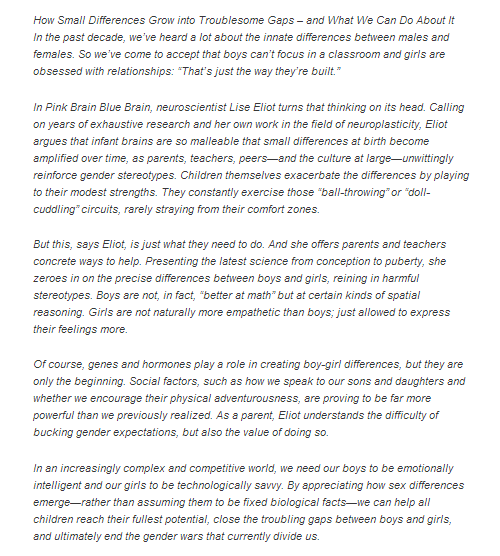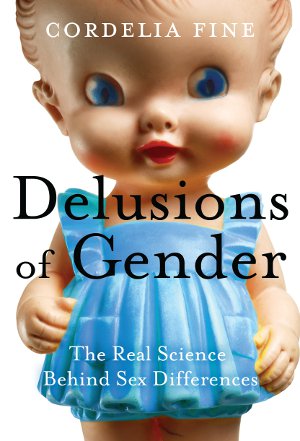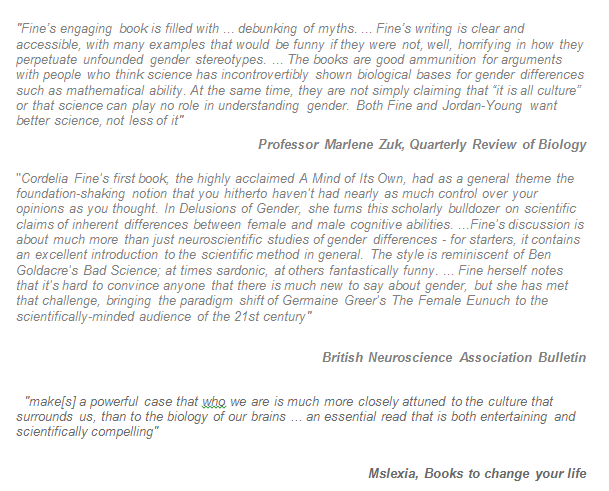If you are interested in reading the scientific evidence of the actual (biological and genetic) brain’s differences between boys and girls/men and women, there are two important books which present and discuss a comprehensive – if not staggering – amount of neuroscientific research.
It is worth to note that both are written by neuroscientists who know their stuff, not journalists or specialised writers! Both books emphasizes the fact that new science discoveries have confirmed that the “neuroplasticity” of our brain make our biological characteristics not a fixed entity, but instead something which is constantly changing and molding through our thoughts moving through it (in other words our interaction with the enviroinment, as our thoughts are inflenced by it).
The first book is PINK BRAIN, BLUE BRAIN by Lise Eliot, PhD. I am reporting the synopsis verbatim as it is really self-explanatory of the content and conclusions of this work:
The second book is THE DELUSIONS OF GENDER by Cordelia Fine, which cover and raving reviews are copied below:
|
I have read both these books and I guarantee you that – once you start reading – you will find very hard to stop! Some of the conclusions really took me by surprise and I noticed that we are constantly fed inaccurate information by a stream of fiction-science astutely popularised by the media. These books have re-shaped drastically my many assumptions about girls and boys’s brain differences. Don’t have the time to read a full book on the topic? Try this short booklet (8 pages!) by Patricia Campbell, PhD, it is from a fairly autorevole source (US Department of Education) and clearly written: http://www.campbell-kibler.com/Stereo.pdf Have a good read and please let me know your reflections too! 😉 |






Interesting research! I wouldn’t mind picking up these two books and giving them a read. It seems we are always finding new approaches to the ‘nature vs. nurture’ debate. I wonder if the truth is more grey than any of us could ever imagine. There are just so many factors to our lives, above and beyond gender, that can still affect our gender roles: location, family, defining moments in our lives. It’s such a broad topic, and it just keeps getting more broad!
I will be adding ‘Pink Brain, Blue brain’, to my book club this year. I think it would really provoke some interesting conversation. Thanks for the great suggestion.
I was discussing your website recently with a friend who then told me about a relative of hers who wanted to try and remove gender stereotypes from their home. They had recently had a child ( I honestly don’t know the sex as they rarely tell people and encourage others not to as well) and were choosing to raise it as gender neutral as possible. Choosing all colors from the rainbow for its clothing until it will be old enough to choose for itself. Choosing neutral toys until again it can decide what it wants to play with, etc. I agree and disagree with some things about this idea. First, I felt like they are doing an experiment on the child. I think they are putting too much emphasis on the gender issue and by trying so hard to erase the stereotype they are making it an even bigger issue. I like that they will put emphasis on letting the child choose, but they could accomplish the same thing by acknowledging the child’s gender and still trying to (as you have suggested in other articles) let it wear clothing of all colors and play with all kinds of toys, etc. Lastly, I dislike referring to the child as “it”! My relative told me they usually use the child’s name as much as possible, or they are ok with using ‘it’ when needed.
I think the issues put forth in this website are so important and I love to learn more and become more aware of these issues. I strongly try to practice – “When you know better, you do better.” But, I don’t let it take over my life or the life of my daughters. Thanks for being such a great, educational sounding board.
Interesting article. I do believe the media is flooded with gender stereotypes that are “half fiction half fact” to suit whatever stance the writer has on the issue. The problem with all these studies though is that it concentrates on men and women as a whole and not on an individual level. Some women are extremely good at maths and have a real problem expressing themselves, whereas some boys are crap at maths and wear their hearts of their sleeves. In today’s day and age men and women are freer than they ever have been to break down barriers and lead the lives they want to. I for one, am great at maths, love being outside and am extremely athletic. I hate cleaning with a passion but I do it because otherwise we live in a pigsty – however my boyfriend has to accept that I refuse to do everything and he has to wash up if I cook and vice versa. He accepts that and we work well as a team.
I’m the same way with this. I hate cleaning, but I do it because I love a tidy home. Although I do most of the cleaning, I do delegate smaller tasks to my boyfriend because I don’t want to do all of the work all the time.
My boyfriend has a hard time expressing himself as he has trouble with creating thoughts. He thinks in pictures versus words, so our communication is lesser than I would like but that’s just how he is because of his experiences growing up. Whereas I am really good with language but terrible with math. He’s great with math but terrible with language.
He loves cooking, and I love playing sports. So the barriers of what is male and what is female are definitely getting broken down I think in this day and age.But there are still old archetypes that are floating around.
Will be adding this to my reading list!
This was an interesting read and something I have never really thought about on a deeper, less superficial, basis. I agree with Rebecca above, the media is consistently inundating us with pseudo science as fact that enhances their particular agenda! To be honest, I tend to believe more in my own direct experience with things and I am usually less inclined to dictate my decisions based on “scientific studies” because I find them to be their own forms of generalizing and ultimately for every scientific study proving something in this field, there will be probably another disproving it on some other basis! But that said, I will be purchasing your suggested reading and not completely dismiss their findings: books can work as a good starting point for reflection and for questioning your beliefs and values, which I think is always a wise thing to do 😉
I would love to read these books. I know that stereotypes are easy to follow when it comes to boys/girls and men/women, but I never thought that there is a mechanical reasoning for the differences.
I did want to let you know that I was not able to click on the link for the brochure.
I’m glad I came upon this article because I will be picking up these books to read for sure, only because they are written by neuroscientists. I don’t know how many books and articles I’ve read on this subject containing almost nothing to back up any points they’re trying to make, so how do they expect anyone – of any opinion on the subject – to take anything seriously?
I think we’re all the same. The only reason boys grow up in such a way that makes them out to be strong and masculine is because in history, it’s how boys were brought up. Many years ago, girls were taught to do what a mother did, as in; cook, clean, be a mother essentially. Times are changing though and men and women are switching it up. I think if children are allowed to grow up without any thing to push them in a certain direction, I think more kids will grow up independently and wont focus on the norms of the past but on the future.
Does that make any sense? I just feel that as a child, we shouldn’t tell them what to like. Their brains are growing until the age of 24 I think it is, so let them choose on their own in due time. I really want to read these books though, see if my thoughts match any of theirs.
I am so glad to hear this research and I will be reading these books at some point in the next 12 months.
As a mother of 3 girls, I was apprehensive of how to raise a boy when my 4th child was known to be male.
I had lots of comments of how he would not want to read or concentrate, how he would be difficult to attain academic achievements and how boys are more “hands on”. Truth be told, two of my three girls are more “hands on” and love arts and crafts at the same time as being academic. My son at only 3 years old is showing signs of being both also.
I’ve done all I can to get rid of social expectations.
Once I have read these books I will be passing them to our school’s headmistress as I know she will appreciate them.
A great bit of information to deliver to us parents who want change in the way our children are seen because of their gender.
Thanks for pointing out these two books, didn’t know there were studies on this matter. I find asserting a certain color for a certain gender foolish and useless. A little girl won’t feel more feminine if she wears a pretty, pink dress and has two pigtails, she just wants to play and feel comfy while doing so.
Did you know that “In the 18th century, it was perfectly masculine for a man to wear a pink silk suit with floral embroidery,” according to Valerie Steele, director of The Museum at the Fashion Institute Technology and a prolific author of fashion books. Now we associate pink with females, delicate things and it’s definitely not a color for men to wear because they MUST wear blue. I wonder in 200 years what would pink be associated with….!
Pink Brain Blue Brain has been on my “To Read” list for a while. I haven’t heard of THE DELUSIONS OF GENDER by Cordelia Fine, but I’ll add it to the list as well. Both books sound like incredible reads. I suggest “Challenging Gender Roles” by Lisa Firth (Cambridge Media Group) as a booklet for children and youth to discuss this topic.
Thank you for the recommendations. I just graduated from college over a year ago and I studied both dance and English education. In many of my education classes we often had the nature vs. nurture discussions as well as discussed child development–it would’ve been nice to read these books then. As a teacher, I work with students of all ages. It is so interesting to see the development of my students and the differences between the sexes. I also have always found it interesting that girls tend to dominate the dance world during their adolescent years, yet in the professional world you often hear of the great male choreographers and dancers. These male dancers often have stories of the trials, and abuse of growing up as a male dancer or even the difficulties of being a male dancer as an adult. What a sad world we live in. As a teacher I try my best to let students go with their natural inclinations and not place them into those “gender stereotypes”. Yet, even though I’m aware of these things, I still catch myself and find it difficult.
Thank you for the advice! These books sound like amazing reads and I can’t wait to see how this relates to gender stereotypes and the role they play in today’s modern culture. I get so much useful information from your website! Thank you again for being so on top of the things that really affect us women. 🙂
I thought the overall book was very interesting and very informative. It was a welcome change of perspective after reading the Female Brain (by a different Author). I am a very research oriented person and I appreciate knowing the statistics. There was one part at the end of “Pink Brian, Blue Brain…” book I disagreed with the Author, and that was concerning the questioning of whether single sex education for girls/woman is useful for the development of girls. As a person who attended two all-women institutes and then went on to study in a male-dominated field at two coed schools for my graduate work, I definitely saw and felt a huge benefit from having attended all-women institutes. And, I received substantial financial aid from all the institutes I attended, so I wasn’t attending them as an economically advantaged person (Lise Eliot points out that the social-economic-factor is a strong indicator of optimal development for both sexes).
Although I had excellent experiences at most of my schools (one coed graduate program wasn’t that fantastic of an experience), I did not experience any form of sexual or gender bias or harassment while attending the all-girl/women schools; I did run into sexism and/or harassment at the coed schools. All-girl/women institutions leave women feeling particularly empowered and positive about themselves. These positive feelings leave women feeling empowered to succeed in a world that is not always fair. These same all-girl/women institutions also work to develop institutions in other disadvantaged places in the World, helping other women to develop to their fullest potential which in-turn helps them and their families and their countries. I hope Ms. Eliot explores the subject more in the future and that she does not emphasize that women would probably do better at coed institutions. In some or possibly many cases, having a safe haven for learning for some part of a person’s life is very beneficial.
This is really interesting! I would love to read either book. I love to learn about the brain, and about gender equality. I hope that with these books we can start scientifically solving the gender equality issue. I would like for my children to live more equally than I did as a child.
Pink Brain Blue Brain has been on my list for a while. I find it interesting how nature and nurture intersect, and it’s nice to see such research coming from scientists. I struggle to not be skeptical towards the idea that almost everything is malleable from a young age. Even in my own life, raised precisely the same as my sisters, with zero demand for us to take on any gender role (and in fact doing plenty of ‘manly’ interests our entire childhoods), I ended up very very feminine with a nurturing personality and I now am feeling the biological DEMAND to have babies soon. I can’t even explain it. My younger sister is very feminine as well, though not quite caring about kids yet. My youngest sister is a complete tomboy.
I think a big issue people make falls with this quote. “The bigot thinks no one is an exception, the idiot thinks everyone is.” And if we aren’t careful, this can be us, one way or another. To me, the survey by Forbes in which 84% of women wanted to be home with their kids speaks volumes to me about the DEMAND for mothers to, well, mother. And I think the idea that something so vital to a woman’s life plays no role in her gender roles is nonsensical.
I will definitely be adding these books to my list! I’m glad to see that this isn’t as small of a topic as I had originally thought it was. The idea that gender roles may be a bad thing is a lot to take on for some people and may come as a shock, but it’s important nonetheless.
Thank you for your recommendation about this book. It’s gonna be another interesting read for sure. It’s fascinating to learn about each and every difference that the opposite gender has until now specially when it comes to the biological characteristics. I always love to read about those. But if it’s true that there’s a scientific basis from this, then this can be read by students too for more research.